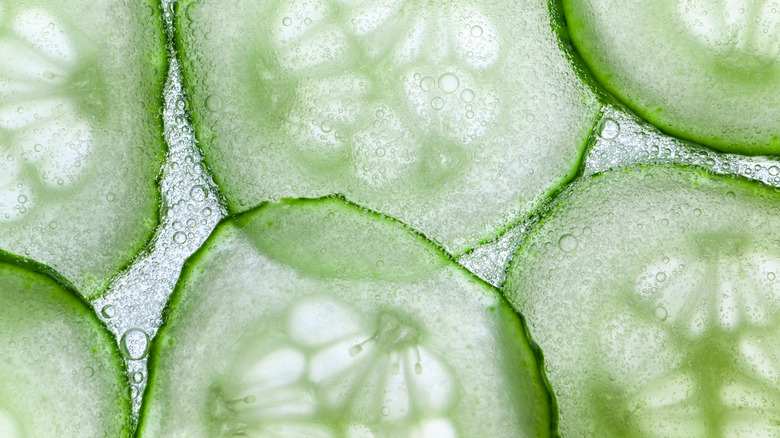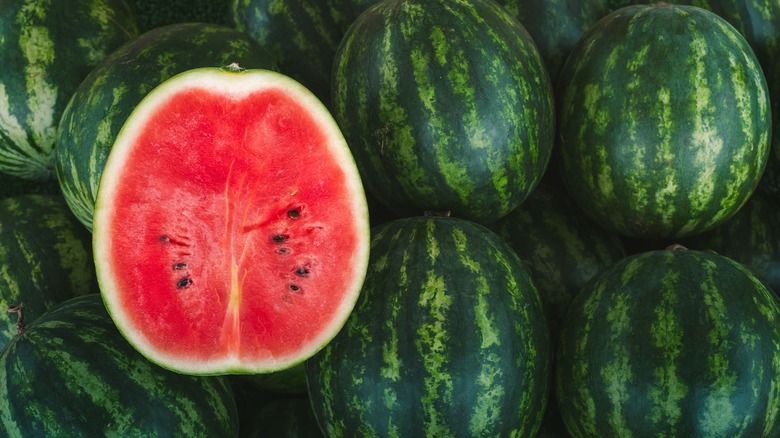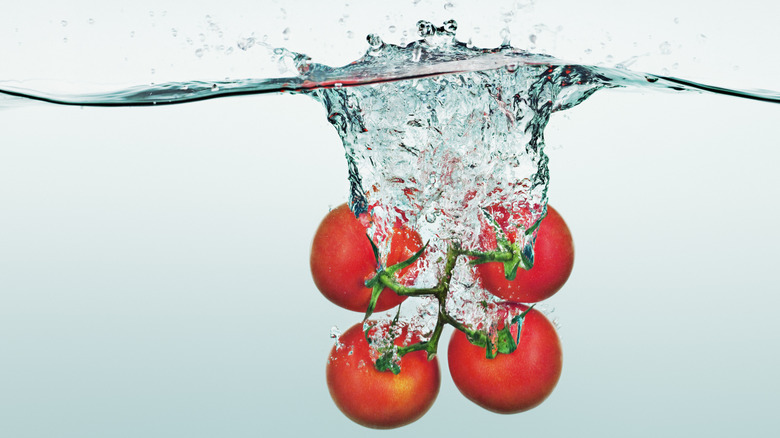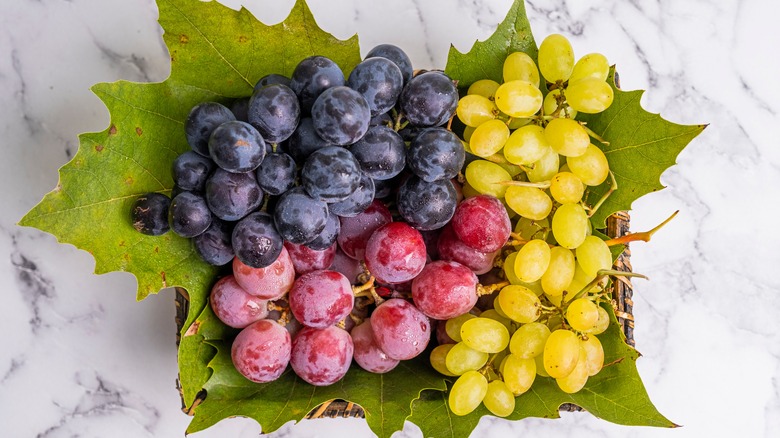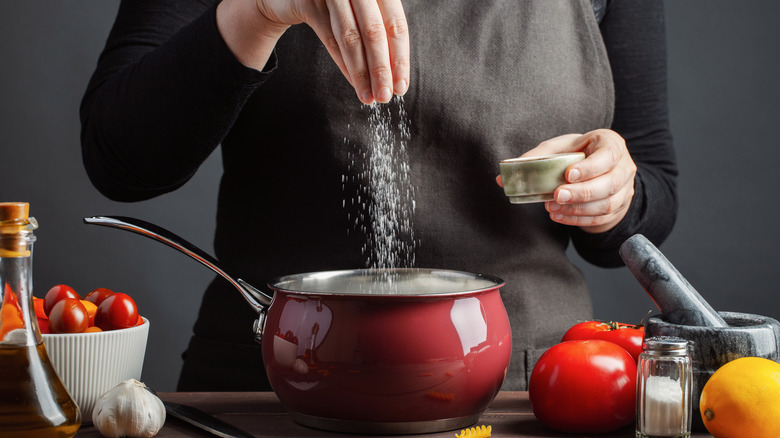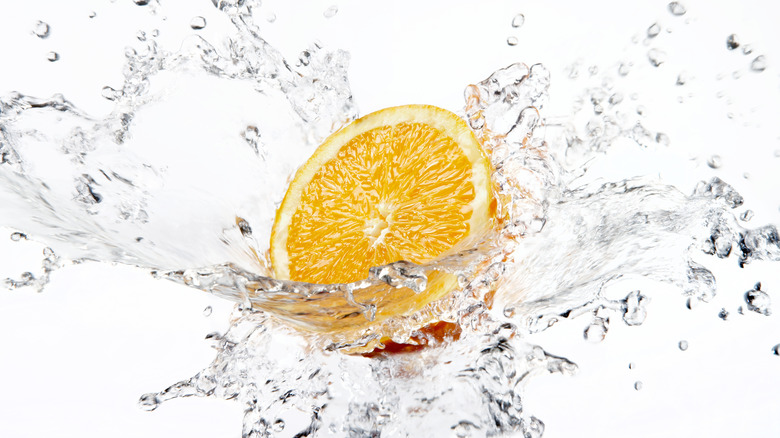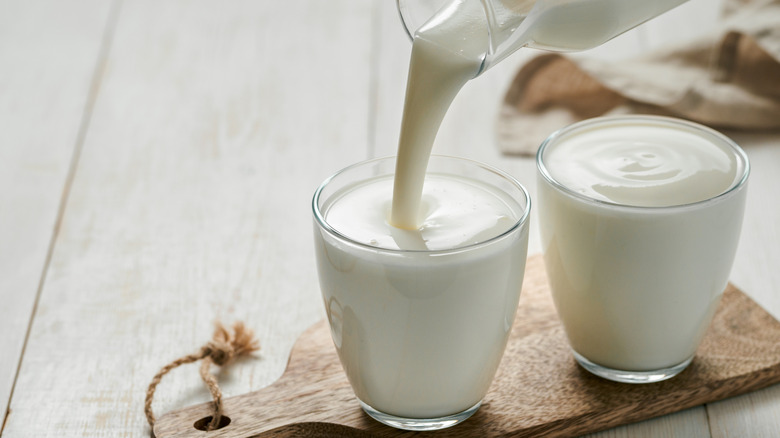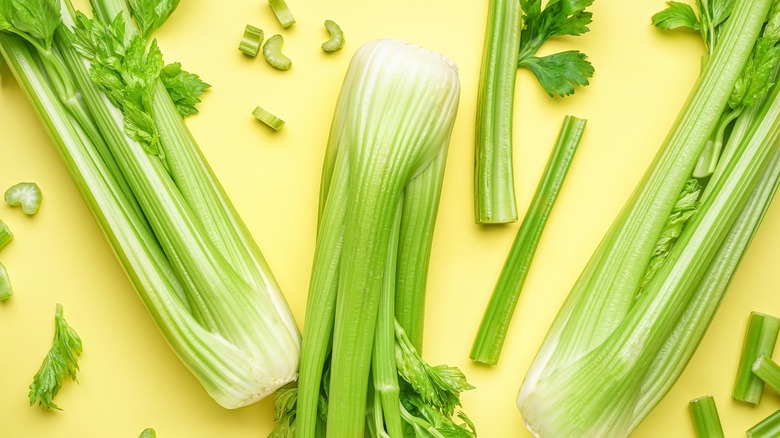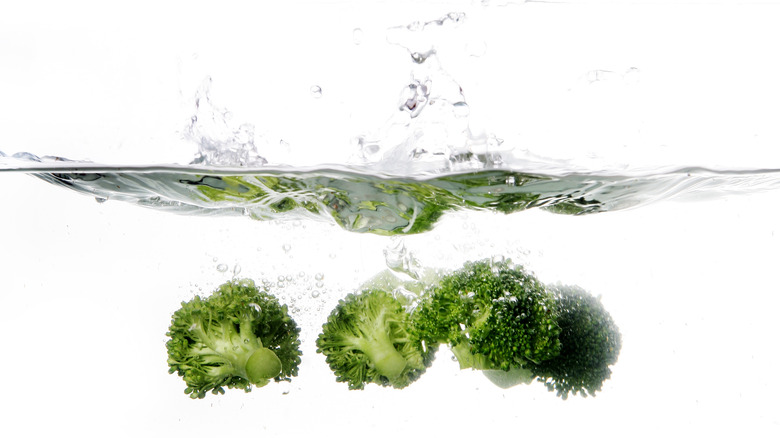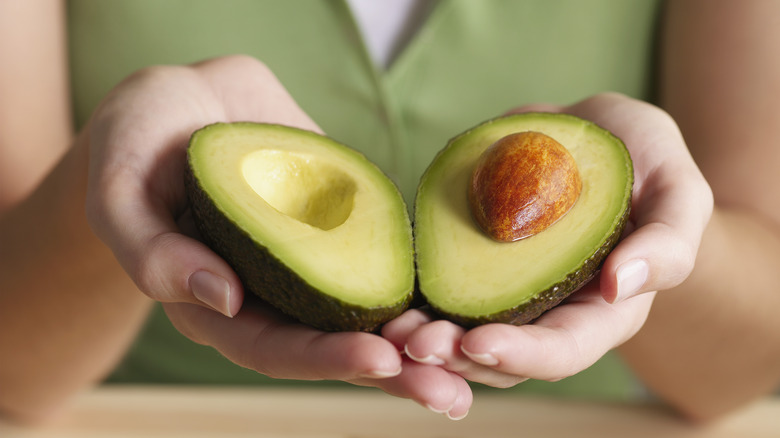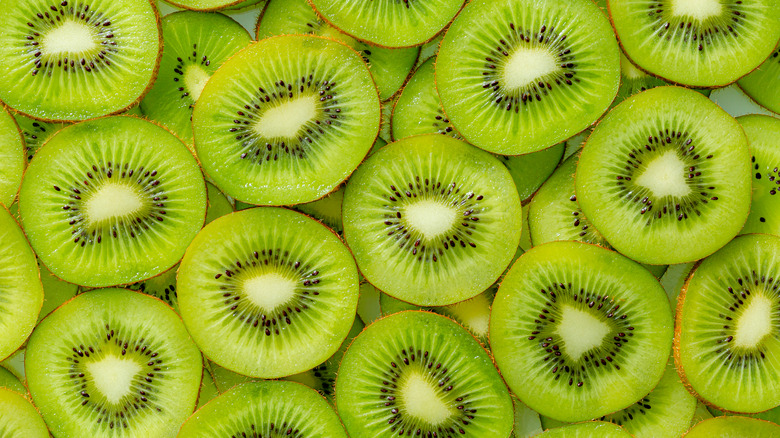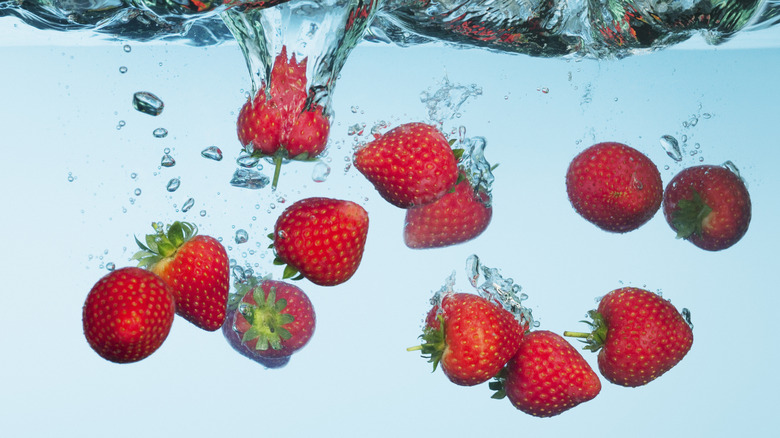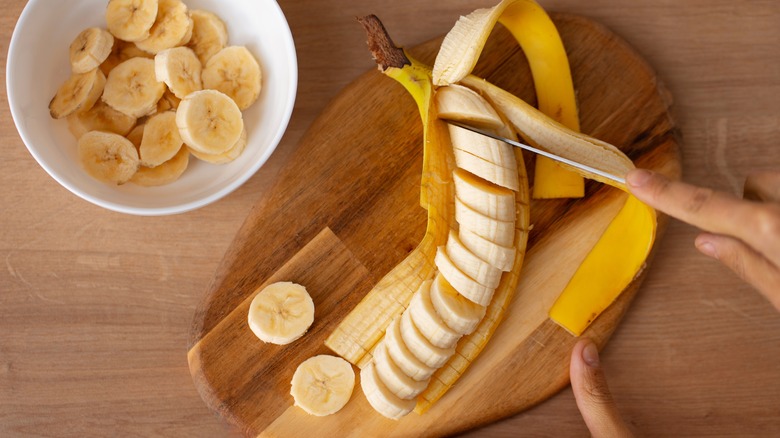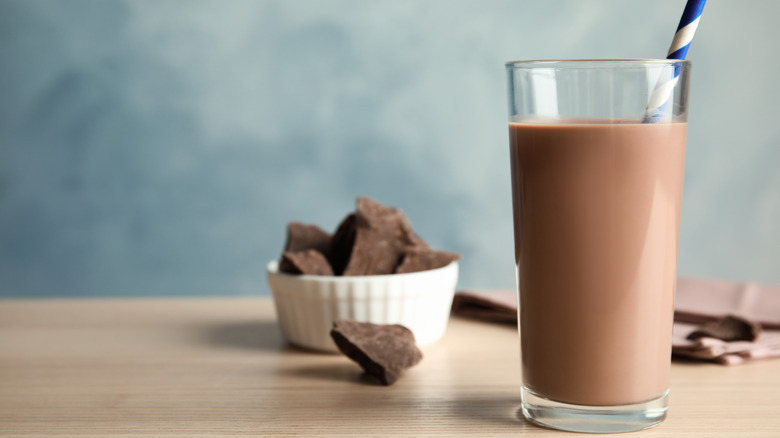Foods You Should Eat If You Are Dehydrated
We may receive a commission on purchases made from links.
Like a sunburn, dehydration is an almost inevitable summertime experience. Also like a sunburn, it's worth avoiding. Water helps regulate your body temperature, protects your organs, lubricates your joints, and carries oxygen to cells. It's such a vital part of your health that it makes up approximately 60% of your body weight. When you lose more water than you take in, such as through sweating in the summer heat or vigorous exercise, these essential functions are thrown off-kilter. In extreme cases, dehydration can lead to kidney failure and brain damage, but even in milder instances, it can cause problems with your heart rate, raise your body temperature, and interfere with your blood pressure.
These issues are caused by an imbalance of your electrolytes, which are minerals that include calcium, magnesium, potassium, and sodium that regulate many of the most essential systems in your body. They facilitate nerve and muscle function, heal damaged tissue, and spark electrical charges from the heart. The body drains electrolytes by various means, such as excessive sweating, with initial symptoms including headaches, muscle spasms, and dizziness. Drinking water will rehydrate you, but you need to turn to other sources to replenish those electrolytes, and it turns out that food is just as good, if not better than sugary sports drinks. Hydrating foods packed with electrolytes are what your body needs to get through a heatwave or a sweaty day in the sun.
Cucumbers
Cucumbers are about 96% water, meaning that you're pretty much taking a sip of water with every crunchy bite. Even though they aren't packed with vitamins and minerals, cucumbers do have trace benefits aside from their hydrating properties. According to the U.S. Department of Agriculture, one cup of cucumber contains a little less than 4% of the recommended daily value of both potassium and magnesium, along with a scant 18 calories.
Whether you don't have access to water or don't feel like drinking, cucumbers are an excellent source of hydration and offer a sneaky boost to your electrolyte deficit. They're also highly versatile. Chop them up and put them in a salad for a refreshing crunch, or double up on your water intake by adding them to whatever summery drinking you're enjoying. And if you're really suffering from the sun, scientists from Jadavpur University in Kolkata, India, have noted that cucumbers are a great way to soothe the skin from sunburn. If you're overheated and dehydrated, munch on half a cucumber and place slices of the other half on your burned skin for a cooling effect.
Watermelon
That first bite of watermelon is a true sign of the beginning of summer. The juicy pink fruit is refreshing, hydrating, and not too sweet, and calls to mind lazy afternoons by the pool and scorching Fourth of July barbecues. At 91% water, it's not quite as hydrating as cucumber, but let's face it, you're probably going to eat several times as much watermelon as you are cucumber. Watermelon is clearly the sweeter option when you need some quick rehydration and aren't in the mood to chug water.
Watermelon is also an excellent source of vitamin C, especially considering its low caloric value. One cup of the fruit contains only 46 calories and provides 12.3 milligrams of vitamin C, which equates to nearly 14% of the recommended daily value. Vitamin C is a crucial antioxidant that helps your body fight off the risks posed by environmental stressors such as smoking, pollution, and sun exposure. It also helps lower blood pressure and build muscle and collagen, the main type of protein in the body. The vitamin can also be found in foods like cauliflower, bell pepper, and Brussels sprouts, but eating watermelon is a much easier sell for most of us than eating a bowl of raw veggies, and it's full of hydration.
Tomatoes
The culinary love affair with tomatoes runs deep. From pizza to ketchup, pasta to antipasti, this humble red fruit that we like to think of as a vegetable can easily be incorporated into just about every savory meal. According to the USDA, Americans eat more than 28 pounds of tomatoes per person each year, making it the second most popular "vegetable" behind potatoes.
Dehydration adds yet another reason to embrace this beloved ingredient. At 95% water, raw tomatoes are nearly as hydrating as cucumbers and 4% more hydrating than watermelon, even though watermelon conspicuously has "water" in its name. Roughly 100 grams of tomato provides more than 15% of your recommended daily value of vitamin C and 5% of the recommended intake of potassium, one of the key electrolytes that you lose through sweating.
Due to their nutritional profile, tomatoes have been linked to many health benefits, including improving cardiovascular health, along with boosting cognitive functioning, and preventing osteoporosis. It's important to note that if you're eating tomatoes to help with dehydration, you should eat them raw, as most cooking methods lead to evaporation of their water content.
Grapes
Grapes are little pockets of hydration. Bursting with juice and sugar, they contain a surprisingly low proportion of water compared to other hydrating fruits and vegetables (81%) but make up for it in irresistibility. Humans have been cultivating grapes for over 8,000 years, and for good reason. Aside from being sweet, hydrating, and perfect for fermenting into wine, they are also full of nutritional benefits, most notably the antioxidant known as resveratrol.
Although the compound can be found in peanuts and blueberries, grape skins hold a much more potent concentration. Studies suggest that resveratrol can help prevent cancer as well as cardiovascular and neurodegenerative diseases such as Alzheimer's. Before you rush out to buy some Spanish red wine to rustle up a cure-all sangria, however, keep in mind that alcohol is a known dehydrator and should be avoided when you're dealing with water loss. To boost your water content and get a powerful dose of resveratrol, stick with whole grapes or grape juice.
Salty soup
Bad things happen when you eat too much salt. It raises your blood pressure, for one, and it can also put a strain on your kidneys and even disrupt your nervous system. But sodium is an essential electrolyte that plays a key role in the regular function of your body by delivering water to your cells. When it's out of balance, it can cause severe ramifications. The most dramatic is hyponatremia, which is often caused by ingesting too much water. The condition can cause vomiting, muscle weakness, and even seizures and coma.
A more common cause of sodium imbalance comes from dehydration through exercise. Salt leaves the body through sweat, which is why your skin often feels gritty after a workout or a day in the sun. When you're dehydrated, your instinct might be to chug water, but it's equally important to keep your sodium balanced by incorporating salt as well. You could hit two birds with one stone at the expense of your taste buds by adding salt to a glass of ice water, or you could have it both ways by turning to a salty soup.
Oranges
You might associate oranges and orange juice with breakfast, but they deserve a place on your list of all-day snacks, especially in hot weather. The sweet, citrusy fruit is 87% water and chock full of nutrients. One navel orange contains 92% of the recommended daily intake of vitamin C, a powerful antioxidant that helps fight inflammation and environmental stressors. It also contributes to the formation of vital structures in the body such as blood vessels, muscles, and collagen.
Oranges also contain a high dose of folates, a form of vitamin B9 that is essential for the immune system and is a key component of a healthy pregnancy. One 140-gram navel orange provides 35 micrograms of folate, which, although only 9% of the recommended daily value, is higher than many other fruits. Oranges are jam-packed with water and nutrients to give your body the boost it needs during a bout of dehydration. Plus, they come in their own packaging. Drop an orange or two in your bag and have a nutritious, hydrating snack ready to go when you need it — no plastic wrap or Tupperware needed.
Yogurt
When you're feeling hot and sweaty, ice cream is probably the only kind of dairy you're craving. But yogurt has a surprising number of benefits and, at 85% water, is almost as hydrating as oranges. Plain, full-fat yogurt provides calcium, one of the most important electrolytes depleted through excessive sweating. A 100-gram serving of yogurt contains 127 milligrams of calcium, which is nearly 10% of the recommended daily value. Calcium strengthens bones, reducing the risk of osteoporosis and fractures, especially in later life. It also helps with muscle and blood vessel contraction.
In addition to calcium and water, yogurt is an excellent source of protein. In fact, 100 grams of plain, full-fat yogurt contains roughly 4 grams of protein, approximately 8% of the recommended daily value. Add a handful of berries to a bowl of yogurt to make a nutritionist-approved snack that is sweet, creamy, and hydrating.
Celery
Celery gets a bad rap due to its fibrous texture and underwhelming flavor, but it deserves a second chance. Not only is it 95% water, but it also contains several key nutrients that should make it a go-to for anyone looking for a vitamin top-up and dehydration cure. Aside from their obvious fiber content, celery is full of flavonoids, a compound with antioxidant properties that has been linked to a host of health benefits. One study found that the flavonoid content of celery significantly inhibited one of the key risk factors behind osteoporosis, and posited that flavonoids are the most important ingredient aside from vitamin D and calcium in preventing bone deterioration.
Eating celery, therefore, has both short-term and long-term benefits. In the short term, it can help rehydrate you and keep your digestion running smoothly thanks to all that fiber. In the long term, it can help you avoid osteoporosis. If you're unsure of how to eat celery without cooking it and losing water and nutrients, try pairing it with your favorite nut butter or even splash it with hot sauce. Trust us: the latter is a match made in heaven.
Broccoli
If you've ever tried to nosh your way through a raw broccoli stem, it may be hard to believe that the fibrous green vegetable is 90% water. All that chewiness is down to healthy fiber, but there are more reasons to eat this cruciferous vegetable. For one thing, it's packed with vitamin C. A 100-gram serving (a little over a cup) provides 91 milligrams of the vitamin, which is more than the recommended daily intake of 90 milligrams. It also contains 85% of the recommended daily dose of vitamin K, which is responsible for bone building and the good kind of blood clotting (via Harvard).
Broccoli is also a key source of carotenoids, a compound found in many green vegetables that helps prevent macular degeneration, a disease that causes vision loss. Studies have also shown that people who have a diet high in carotenoid-heavy foods were 18 to 50% less likely to develop cataracts. Luckily for those of us who aren't thrilled by the idea of digging into a pile of raw broccoli even to cure dehydration, research suggests that steamed broccoli retains most of the nutrients found in raw broccoli. It also has the added benefit of injecting even more water into the water-rich vegetable.
Avocados
Any fan of the buttery texture of avocados will not be surprised to learn that they do not have a particularly high water content. And yet, when it comes to combating dehydration, these oil-rich fruits have a lot to offer. Only 73% of an avocado's weight can be attributed to water, but 100 grams of it will give you 10% of your recommended daily dose of potassium and 7% of the recommended intake of magnesium. Both nutrients are vital electrolytes that are lost through sweat.
Potassium regulates blood pressure, triggers muscle contractions, and supports the fluid level in cells. Magnesium supports a wide range of concerns, including bone growth, DNA production, blood pressure, and nerve and muscle function. Eating avocados — even the ever-so-cliche avocado toast or store-bought guacamole — after sweating for an extended period of time will help replenish these essential electrolytes and provide healthy fats to satiate your appetite.
Kiwis
The kiwi is often relegated to the tropical area of the produce section, but it deserves a prominent position in your everyday diet, especially if you're dehydrated. It's about 84% water and boasts a dizzying array of health benefits. One 75-gram fruit has 56 milligrams of the immune system powerhouse vitamin C, equating to roughly 62% of the recommended daily intake. Kiwis also contain the carotenoids known as lutein and zeaxanthin which have been shown to improve eye health. A 1994 study published in the Journal of the American Medical Association found that people who consumed high levels of lutein and zeaxanthin lowered their risk of contracting macular degeneration, an age-related vision condition, by 43%.
Incorporating this vibrant tropical fruit into your diet is easy. Add slices to a water-rich fruit salad, or simply eat a whole kiwi on its own. If you want to maximize the health benefits of this nutrient-dense fruit, eat kiwi with the peel on. It might take some adjusting and tolerance for a little tanginess, but the skin has three times more fiber than the flesh and is full of nutrients.
Strawberries
Strawberries are 91% water and 100% delicious. Americans love them so much that we each eat an average of eight and a half pounds of them every year (via Statista). They're also easy to combine with other hydration-friendly meals, such as a refreshing fruit salad with yogurt dressing. You can also add them to sparkling water for added flavor, or sprinkle them with salt to enhance the flavor and rebalance your sodium levels if you've been sweating.
As if their taste and water content weren't enough, strawberries are full of nutrients. They are rich in antioxidants, which scientists have asserted may prevent cancers and multiple types of cardiovascular and neurodegenerative diseases, and like oranges, are high in folate and vitamin C. According to a Swedish study, 100-gram serving has approximately 13% of the recommended daily dose of folate, and 67% of the recommended daily intake of vitamin C. Additionally, the compound in strawberries and other plants known as polyphenols has been shown to increase insulin sensitivity in non-diabetic adults, meaning they may help your body metabolize sugar and prevent type 2 diabetes. This sweet, water-rich berry is a great way to rehydrate in the summer heat while stocking up on key nutrients.
Bananas
You might have heard that bananas are one of the best foods to fight dehydration and wondered why, considering that it isn't the juiciest of fruits. The answer lies not in its relatively low water content (75%) but in its high dose of potassium, one of the most important electrolytes that your body loses through sweating. Potassium is responsible for fluid regulation inside cells along with muscle contraction. It also helps with blood pressure. In addition to potassium, bananas contain vitamins and minerals that help with bone density and are an excellent source of fiber. One fruit contains about 19% of the recommended daily value.
Some people steer clear of the yellow fruit because of its carbohydrate and sugar content, but these factors are a plus if your dehydration is the result of physical exertion. You need carbohydrates for exercising, and bananas are a natural, nutrient-rich alternative to processed snacks. If you want to make it a complete energy package, spread the fruit with salty nut butter for extra fat, sodium, and protein.
Chocolate milk
Who wants to drink water when chocolate milk might be just as good, if not better, at treating dehydration? It might sound too good to be true, but there is plenty of science behind it. A 2018 meta-analysis published in the European Journal of Clinical Nutrition found that athletes recovered faster when drinking chocolate milk than they did when drinking placebos and sports beverages. The findings don't only apply to high-level athletes or those looking to build muscle. Chocolate milk is beneficial because it contains carbohydrates, which provide energy and protein, which help repair muscle, electrolytes, and, of course, provide hydration. Most of these attributes benefit a person who is dehydrated due to sweating, though some may want to steer clear of high-calorie, sugary drinks.
One cup of Horizon Organic 2% Chocolate Milk contains 10% of the recommended daily value of potassium and 20% of the recommended value of calcium, both of which are vital electrolytes. It also provides a quarter of the recommended amount of vitamin D and a whopping 50% of your daily quota of vitamin B12, which contributes to brain health, builds red blood cells, and heightens energy levels. If you're dehydrated, you could do a lot worse than chugging a bottle of chocolate milk.

